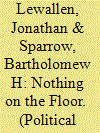|
|
|
Sort Order |
|
|
|
Items / Page
|
|
|
|
|
|
|
| Srl | Item |
| 1 |
ID:
163360


|
|
|
|
|
| Summary/Abstract |
MEMBERS OF CONGRESS HAVE MANY WAYS TO ACHIEVE their multiple goals of being reelected, making policy, and gaining power and prestige within their institution. Of these, roll call voting is the most visible and, many scholars argue, the most important signal that legislators send to their constituents, colleagues, and interest groups about their positions and achievements.
Yet since 1790, and permanently since 1794, the U.S. Congress has included delegates who cannot vote on the House floor—those from the United States’ territories. Congress currently includes five delegates from the U.S. island territories (Puerto Rico, the U.S. Virgin Islands, Guam, American Samoa, and the Northern Marianas) as well as a delegate from Washington, DC. None of them is able to participate in roll call votes on the House floor, yet these delegates represent 4.52 million total residents which, according to 2015 Census Bureau estimates, would amount to the 26th most populous state between Louisiana (4.7 million) and Kentucky (4.4 million) in size.
|
|
|
|
|
|
|
|
|
|
|
|
|
|
|
|
| 2 |
ID:
095522


|
|
|
|
|
| Publication |
2010.
|
| Summary/Abstract |
The management of U.S. national security (i.e., the coordination of foreign policy, grand strategy, military planning, and force requirements), has become the responsibility of the national security advisor. Curiously, however, the position of national security adviser-arguably the "first among equals" in the determination of diplomatic, economic, and military relations-is not even mentioned in the 1947 National Security Act. The National Security Act, which created the National Security Council (NSC) to replace the State-War-Navy Coordinating Committee (SWNNC), merely refers to "a civilian executive secretary" to be appointed by the U.S. president. In fact, the "assistant to the president for national security affairs," the formal title of the national security adviser, is by statute simply the chairperson of one committee-the Committee on Foreign Intelligence-created within the NSC.
|
|
|
|
|
|
|
|
|
|
|
|
|
|
|
|
|
|
|
|
|